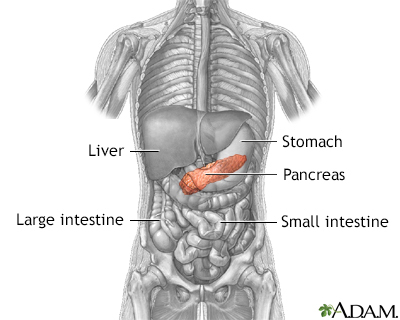Definition
VIPoma is a very rare cancer that usually grows from cells in the pancreas called islet cells.
Alternative Names
Vasoactive intestinal peptide-producing tumor; VIPoma syndrome; Pancreatic endocrine tumor; Verner-Morrison syndrome; WDHA
Causes
VIPoma causes cells in the pancreas to produce a high level of a hormone called vasoactive intestinal peptide (VIP). This hormone increases secretions from the intestines. It also relaxes some of the smooth muscles in the gastrointestinal system.
The exact cause of VIPomas is not known.
VIPomas are often diagnosed in adults, most commonly around age 50. Women are more likely to be affected than men. This cancer is rare. Each year, only about 1 in 1 million people are diagnosed with a VIPoma.
Symptoms
Symptoms of VIPoma may include any of the following:
- Abdominal pain and cramping
- Diarrhea (watery, and often in large amounts)
- Dehydration
- Flushing or redness of the face
- Muscle cramps due to low blood potassium (hypokalemia)
- Nausea
- Weight loss
Exams and Tests
The health care provider will perform a physical exam and ask about your medical history and symptoms.
Tests that may be done include:
Treatment
The first goal of treatment is to correct dehydration. Fluids are often given through a vein (intravenous fluids) to replace fluids lost through diarrhea.
The next goal is to slow the diarrhea. Medicines can help control diarrhea. One such medicine is octreotide. It is a manmade form of a natural hormone that blocks the action of VIP.
The best chance of a cure is surgery to remove the tumor. If the tumor has not spread to other organs, surgery can often cure the condition.
Support Groups
You can ease the stress of illness by joining a cancer support group. Sharing with others who have common experiences and problems can help you not feel alone.
Outlook (Prognosis)
Surgery can usually cure VIPomas. But, in one third to one half of people, the tumor has spread by the time of diagnosis and cannot be cured. However, it grows fairly slowly, and its effects can be often controlled by octreotide.
Possible Complications
Complications may include:
- Cancer spread (metastases)
- Cardiac arrest from low blood potassium level
- Dehydration
When to Contact a Medical Professional
If you have watery diarrhea for more than 2 to 3 days, contact your provider.
References
Asban A, Patel AJ, Reddy S, Wang T, Balentine CJ, Chen H. Cancer of the endocrine system. In: Niederhuber JE, Armitage JO, Kastan MB, Doroshow JH, Tepper JE, eds. Abeloff's Clinical Oncology. 6th ed. Philadelphia, PA: Elsevier; 2020:chap 68.
National Cancer Institute website. Pancreatic neuroendocrine tumors (islet cell tumors) treatment (PDQ) - health professional version. www.cancer.gov/types/pancreatic/hp/pnet-treatment-pdq. Updated August 19, 2022. Accessed December 15, 2022.
Öberg K. Neuroendocrine tumors and related disorders. In: Melmed S, Auchus RJ, Goldfine AB, Koenig RJ, Rosen CJ, eds. Williams Textbook of Endocrinology. 14th ed. Philadelphia, PA: Elsevier; 2020:chap 45.
